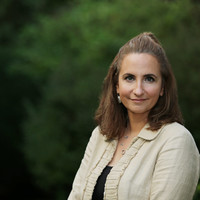"What's the topic this week?" my husband asked as I settled down to write my column today. "Kiev?"
I groaned.
"Ugh, no. I'm no expert on Ukraine."
I'm not a diplomat or a foreign policy whiz, and my performance on a Wordle-ish geography game I've been playing has so far been unimpressive.
My sight recognition of countries like Suriname and Micronesia, while probably better than average, embarrasses me so much I usually cheat and Google.
I mean, what do I know about Ukraine?
I can't even understand what this is about — why Russian dictator Vladimir Putin referenced decades-old squabbles in his speech announcing the deployment of a "peacekeeping" force to the region.
"What nonsense is this?" I thought, listening to him complain about Vladimir Lenin not getting enough credit for creating Ukraine. He sounded like an old man, full of bile and enamored with the sound of his grievances. I wandered away from the TV the same way I'd wander away from someone complaining about how kids don't get hit enough these days.
Putin's putting the band back together, only the band in this case is the Soviet Union and he's occupying sovereign countries and killing people to do it.
But what we should do about it — there I'm out of my depth.
I'm still trying to figure out whether to let our son go to school maskless, debating endlessly with myself about whether it's worth the risk to him and others.
Our school district held a meeting recently to vote on the topic, and my son came home that day chanting, "mask optional, mask optional, mask optional" like a tiny bureaucratic automaton. The teachers had talked to them about what it might be like to see some of your friends wearing masks and others not.
They did a skillful job of impressing upon the kids that the right decision for them might not be the right decision for another person.
"We shouldn't tell our friends they're bad for wearing a mask or not wearing one, honey," I said, worried my little test proctor of a child would feel it incumbent upon him to correct his kindergarten classmates.
"Geez, I know that, Mom," he said, sighing, already sick of the subject.
I didn't have any good answers, feeling torn between what's admittedly a minor risk of illness and death for our son and the possibility of extending the lifespan of a disease we already have borne too long.
What should we do?
I don't know. I couldn't even figure out what to do the other day watching a nanny put a small child in an extended time out, more than an hour long at least, as he was forced to watch the other kids play and gambol around him.
It's not my place, I kept telling myself, sick at the look of shame on his face. What, even, would I do?
A couple of times, I murmured a mild comment about the length of the punishment but couldn't bring myself to interfere more.
I don't know the back story, I thought. I don't know that kid or his parents or his nanny.
"Children are in a war zone right now," my husband reminded me when I told him how I couldn't stop thinking about the boy. "There are worse things than an hourlong time out."
Later in bed, though, I cried. Not for the child — who didn't seem injured or hungry or sick — but out of helplessness. Ukraine, COVID, even a boy sitting across the room from me — I'm not certain of anything other than the wrongness I feel.
But what to do? I asked, getting no answer.
What to do, what to do, what to do?
To learn more about Georgia Garvey, visit GeorgiaGarvey.com.






View Comments